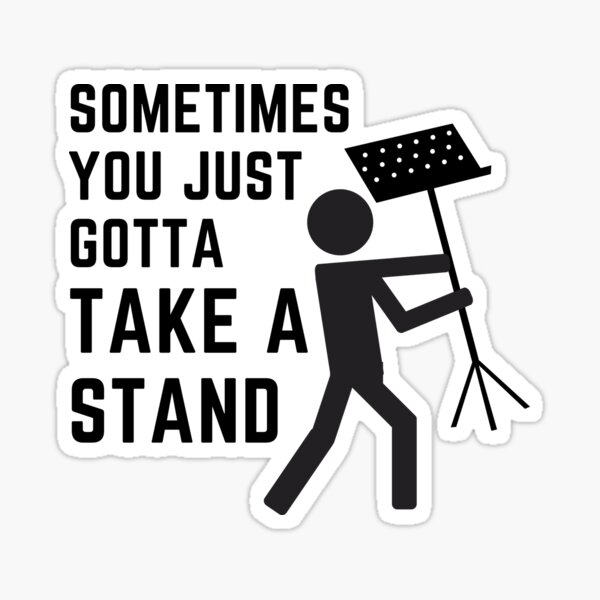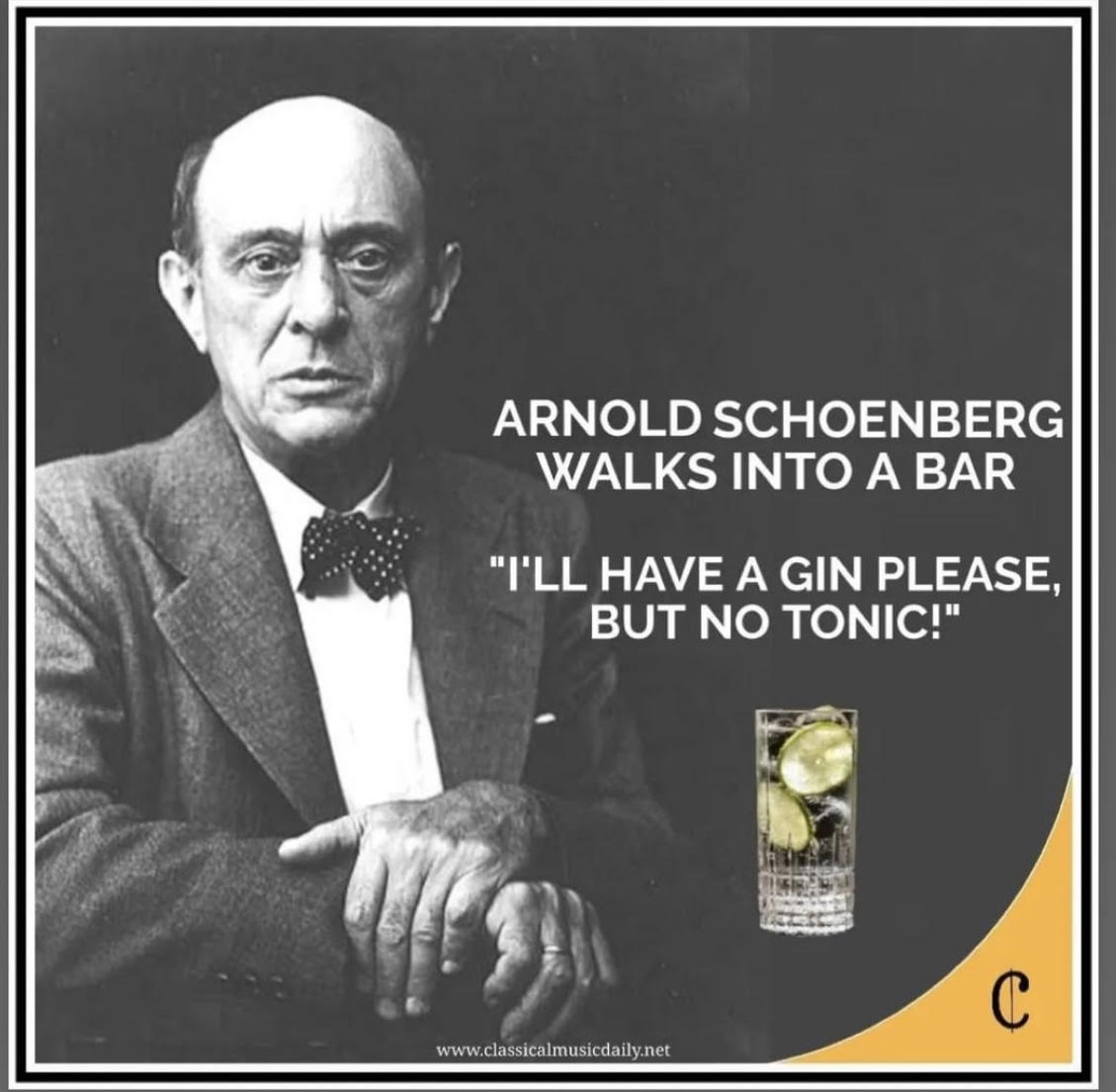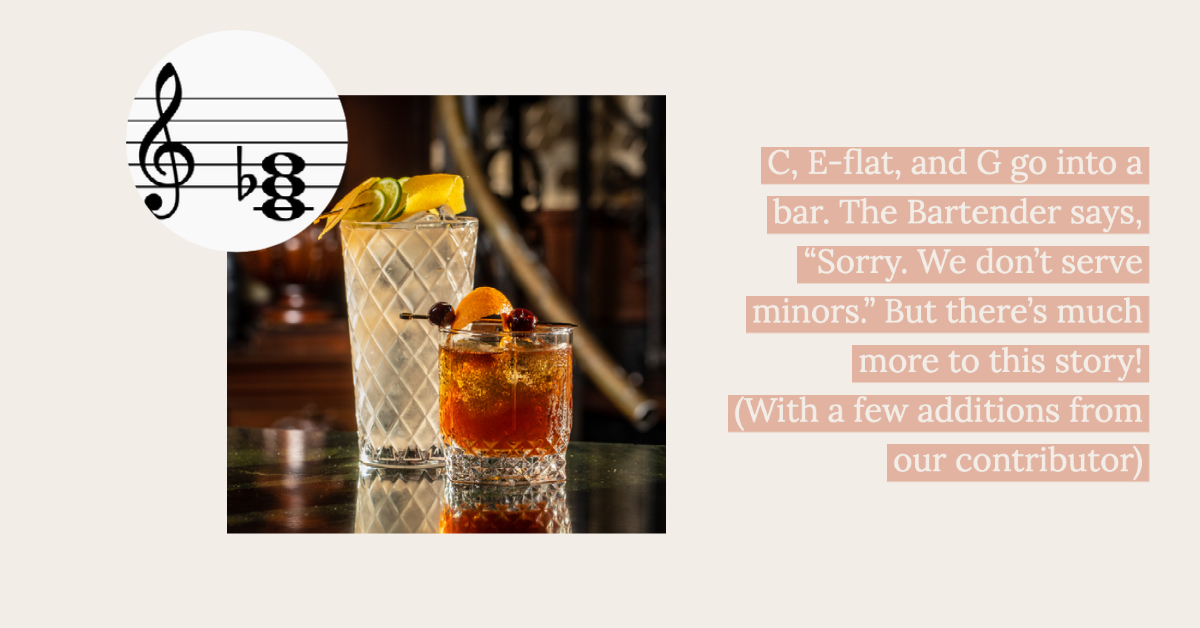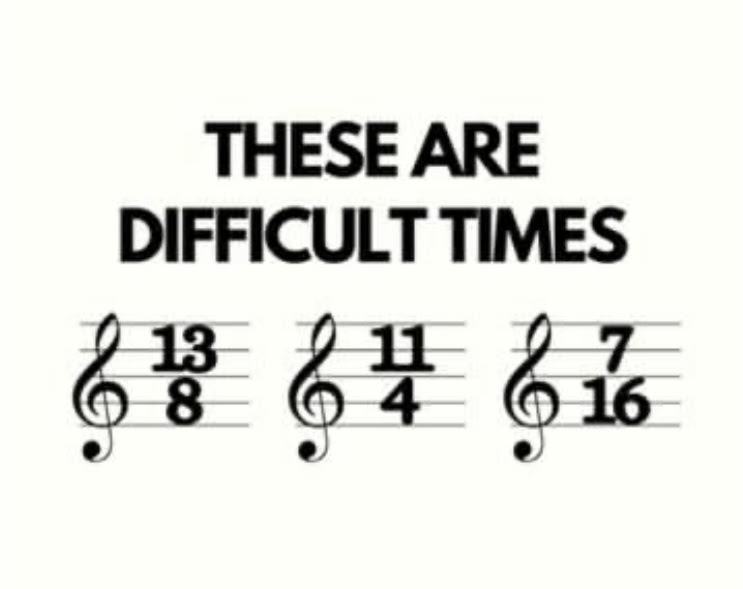By Janet Horvath, Interlude
Musicians, like so many others, enjoy jokes, especially those that are puns related to music, composers, and musicians. Backstage, even onstage during rehearsals, these anecdotes, puns, and gags fly. Perhaps it’s because we spend so much time in a practice room, we get punchy and resort to joking about it. As students we start out with simple short quips:

Why is a piano so hard to open?
Because the keys are on the inside.
What is the difference between a fish and a piano?
You can’t tuna fish.
Want to hear the joke about a staccato?
Never mind. it’s too short.
How do you fix a broken tuba?
With a tuba glue.
While gleaning knowledge of the finer points of theory, as we develop as musicians, and so do our jokes, becoming more sophisticated. Perhaps it’s less likely that the uninitiated will “get” the joke immediately. Like this one:
Arnold Schoenberg walks into a bar, “I’ll have a gin please but no tonic.”

This jest is a favorite among musicians:
C, E-flat, and G go into a bar. The Bartender says, “Sorry. We don’t serve minors.”
But there’s much more to this story! (With a few additions from me…)

So, E-flat leaves, and C and G have a fifth between them. After a few drinks, the fifth is diminished and G is out flat. F comes in and tries to augment the situation but is not sharp enough. D enters the bar and heads for the bathroom saying, “Excuse me; I’ll just be a second.”
Then A comes in, but the bartender is not convinced that this relative of C is not a minor. Then the bartender notices B-flat hiding at the end of the bar and says, “Get out! you’re the seventh minor I’ve found in the bar tonight!” The bouncer is asked to take a stand, and he doesn’t let the quavers into the bar because they are slurring.
The refrain continues tempo rubato.
E-flat returns the next night, all gussied up, in a three-piece suit with nicely shined shoes. The bartender notices, “You’re looking sharp tonight. Come on in! This could be a major development.” Sure enough, E-flat soon strips taking off his suit and everything else and suddenly he is au natural. Just a second, “says the bartender, “I’m going to prevent you from walking into another bar. That would cause difficult times and lead to repercussions!” The tenor of his remarks is all too clear.
Eventually, C sobers up and realizes in horror that he and E-flat are under a rest. E-flat gets into treble and C is brought to trial, found guilty of contributing to the diminution of a minor, and is sentenced to 10 years D.S. without Coda at an upscale correctional facility. This noteworthy opus is a cue for other minors.
All types of musicians and artists like to mutter wisecracks. American comedian and actor George Carlin came up with a good one:
If lawyers are disbarred and clergymen defrocked. Doesn’t it follow that electricians can be delighted and musicians denoted?
And artists criticizing other artists is not new:
“Wagner has beautiful moments but bad quarters of an hour.” Gioachino Rossini.
“A gentleman is someone who knows how to play the banjo – and doesn’t” Mark Twain.

Several of the conductors I have worked with wouldn’t hesitate to tell a few good jokes. Leonard Slatkin loved to tell stories and Neville Marriner engaged in plenty of practical jokes. I recall a children’s concert when we played Manuel de Falla’s Three Cornered Hat. Instead of a baton he whipped out a long-legged rubber chicken and proceeded to conduct waving the prop. Most of the orchestra lost their grip.
But musicians love to poke fun at conductors. This “accusation” is a case in point, from The Onion, “America’s Finest News Source,” “maintaining a towering standard of excellence,” and notorious for their satirical articles:
Philharmonic Orchestra Conductor Receives 8-Concert Suspension For Using Corked Baton
Published June 15, 2022
BOSTON—An investigation into the musician’s suspiciously powerful work concluded Tuesday as Boston Philharmonic Orchestra conductor William Ness reportedly received an eight-concert suspension for using a corked baton. “We have a zero-tolerance policy against cheating, and Mr. Ness knew that, which is why we believe that a long suspension that will cause him to miss the summer concert series in the park is necessary to ensure we maintain integrity in our philharmonics,” said National Orchestra Association spokesperson Leonid Radzinsky, adding that Ness had been under investigation after an anonymous member of a competing orchestra alleged that the maestro’s baton sounded corked as it whirled through the air. “We’re disappointed that it had to come to an investigation, but Mr. Ness’ recent sharp increase in keeping the woodwinds coherent and controlling the volume of the timpani did raise some eyebrows.
Normally you don’t see that much of a leap in precision unless the baton’s been tampered with to become lighter. We can’t end up in a situation where an audience member questions whether a conductor bringing in the cello section at the perfect time is due to skill alone or due to modifications that give them an unfair advantage. We need to ensure that the product we offer our fans is above suspicion…”
We musicians, although we’re very serious about our music-making and the dedication it takes to be successful in this wonderful field, can’t help these moments of levity. Who can?

 While the physical symptoms are easily understood and can be managed with simple exercises, managing the psychological symptoms of Performance Anxiety is more complex. Fundamentally, Performance Anxiety stems from fear – the fear of making a mistake and looking foolish in front of audience, colleagues, tutors and friends. This is reinforced by an unhealthy focus on perfectionism which is inculcated in musicians in the early stages of their training and reiterated through the commentary of critics and reviewers and high-quality, “perfect” recordings.
While the physical symptoms are easily understood and can be managed with simple exercises, managing the psychological symptoms of Performance Anxiety is more complex. Fundamentally, Performance Anxiety stems from fear – the fear of making a mistake and looking foolish in front of audience, colleagues, tutors and friends. This is reinforced by an unhealthy focus on perfectionism which is inculcated in musicians in the early stages of their training and reiterated through the commentary of critics and reviewers and high-quality, “perfect” recordings.